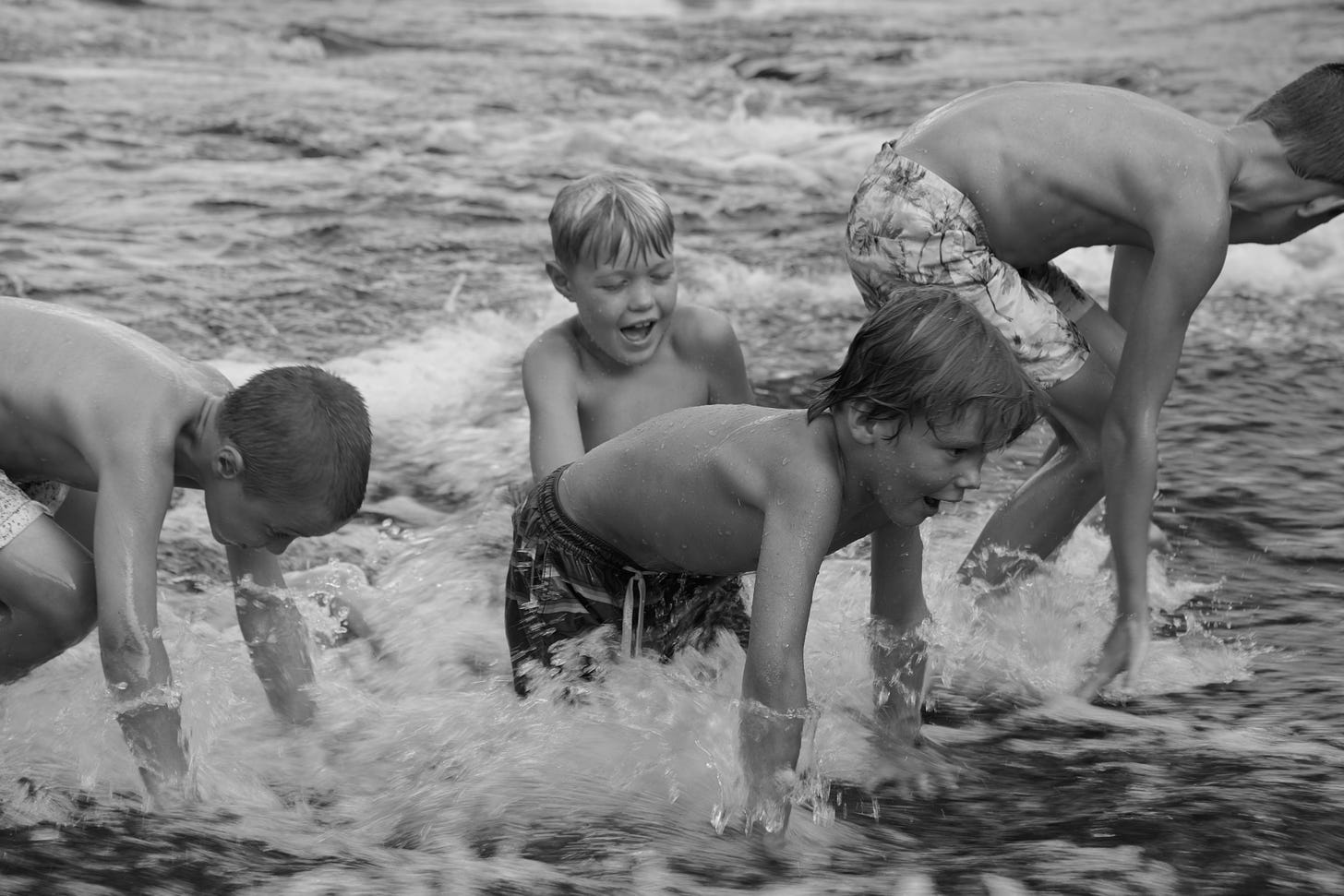In a few weeks, I’m teaching an online webinar about the role of play in writing—attempting to persuade a bunch of writers that aimless creativity is often far more interesting, exciting, and sustainable than agenda-oriented creativity. In other words, writers who only fulfill assignments, write toward deadlines, and chase bylines are guaranteed to burn out. If writing is, as they say, a game of endurance, then playfulness and experimentation are the refreshing cups of water we pour down our parched throats at every mile marker.
In case you’re curious, here’s the class info. I’ve been interested in “creative play” from a pedagogical and craft perspective for a couple years, and I’ve done a good bit of research on the topic of play in general (such as this book, this one, this one). You may remember that I wrote about creative play in a BTT post called Toward the Walrus.
But none of that is the point of this post—not exactly.
Lately, when I sit down to write this newsletter, it feels to me like the “topic” of God has become the elephant in the Between Two Things room. For many (many) reasons, I write around God, over and under God, past God, and, arguably, even inside God.
What I don’t do is write about God.
Actually, you might be here because you read this piece, which is a rare (published) example of my years-long wrestling match with religion. I sometimes wonder if people who found me by way of that piece wonder why I don’t write about God here. (On the other hand, I wonder if people who found me from a writing class or another essay will run screaming if I invoke the three-letter-word.)
Listen, I’m just over here trying to hammer out newsletters between marinating pork tenderloin, scraping toothpaste crust off bathroom counters, and returning ill-fitting tights to the ballet store. I’m not trying to publish hard stances on the vast and vicious internet just so people can moan and name-call and shout Bible verses at me. The anger of American religious people is one reason I avoid writing about God.
I won’t write about God, but I will tell you how I think about God (and it has very little to do with hard stances).
Peter Gray at
is a research professor of evolutionary psychology and neuroscience at Boston College, and he’s been studying play for years. In this TED talk, which is worth 16 minutes of your time (especially if you are a parent), Gray makes the case for encouraging more play among modern children.You’ll have to read his work to get the stats, but Gray argues persuasively that kids’ social, mental, emotional, and physical skills have declined in correlation to “play deprivation” over the past 60 years. True play is self-directed and self-controlled. It’s agenda-free (done for its own sake), voluntary, inherently attractive, and free from time. If we’re doing it right, we stop thinking about how we seem to others, we improvise, and we desperately want to keep doing the thing.
You know what religion in America isn’t? It isn’t very fun.
Maybe adults are play-deprived too… especially religious ones.
I’m not saying God isn’t a serious thing. To me, God is The Most Serious Thing.
I’m saying that (like a goal-obsessed writing practice) tight, controlled, top-down religious practice doesn’t tend toward “interesting, exciting, and sustainable.” It tends toward rage, fear, and burnout.
If you tell a modern parent that kids don’t play anymore, they are likely to respond, “Yeah right! My kid plays baseball, soccer, AND tennis!” Peter Gray points out that, in organized sports, kids are adult-directed instead of self-directed. In baseball, for example, kids are wearing uniforms and being coached by adults, and parents line up on the sidelines to cheer on their every move. If we’re not careful, this kind of activity can start to resemble work more than play.
Sound familiar to any of you church people? The ones of us who put on our uniforms and wait to be coached in the life of faith by other, smarter adults? The ones of us always under the watchful eye of someone waiting to correct, train, and redirect?

A confession: I’m not interested in play because I’m good at it. I’m interested in play because, in my day-to-day life, I rarely remember to consider fun a worthy objective.
Actually, for several years in my twenties, my life became so serious that I began to think of play as the only way out. Nothing was going the way I had expected and, without clearly defined goals, I was at a loss. In desperation, totally against my nature, I began to hunt for fun. I signed up for horseback riding lessons, hula hooped on Main Street, and smoked a pack of cigars on my front porch swing. It’s a post-covid cliché now, but making bread became a spiritual practice for me long before it was cool.
Play is not my specialty, but, more than once, play has rescued me.
I may be bad at play, but I have been very good at religion. I have been very good at rule-following, including showing up to church on Sundays, reading my Bible, and evangelizing anyone who dared sit next to me at the high school lunch table.
Actually, I sometimes wonder if I have been good at religion because I have been bad at play.
Rules work and work and work… and then they stop working. Rules efficiently move you from Point A to Point B, and then all the sudden Point B drops off the map. What will take the place of rules? How will you keep going?
Play.
Eventually I had no choice but to loosen up a little about God. Playfulness, I think, rescued my religion. In his book Playful Intelligence, Anthony DeBenedet identifies forty qualities linked to adult playfulness, including being adventurous, energetic, humorous, imaginative, and spontaneous.
Yeah, that’s not the religion with which most of us are familiar, nor is it the kind of intelligence we were encouraged to have.
I know why kids don’t “free play” anymore: society is hostile to it. If we allow unstructured, unsupervised play, the kids will get behind in their achievements, the neighbors will tell on you, someone will snatch your child right off the street. We parents won’t let our kids play because we are afraid they’ll do it wrong.
Society is hostile to play in faith spaces, too. Church sanctuaries and seminaries are hardly the realm of play. We can’t play, church leaders (and psychologists and wellness gurus) tell us, because we might do it wrong. Everybody is afraid we might do religion wrong. We might do God wrong. And are there any higher stakes than the ones of hell?1
But by definition, a child’s play must be self-directed rather than supervised by adults. For a child, real play happens not on a little league baseball diamond, then, but on a playground. Or better, in a field or river.

Peter Gray argues that play is essential to human development and thriving. And, he says, “From a religious perspective, we might say that play is God’s gift, the thing that makes life on earth worthwhile.”
I’ve learned at least as much about God in fields as I have inside buildings.
What if God is fun? What if faith isn’t a test with right and wrong answers?
Do not misunderstand me: Like children, humans need careful guidance. They need rules. They need leaders. They need community and accountability.
But that isn’t all people need. People also need to play. Even (especially?) religion needs imagination, humor, spontaneity, and wonder. To rediscover play (and, in doing so, to live meaningful lives), DeBenedet recommends breaking routines, holding emotions lightly, and reframing opinions into questions.
Over at the New York Times, Jessica Grose has been writing about religion in America. Here’s Part One, Part Two, Part Three, and Part Four of her fascinating series. Grose cites research that Americans are “leaving church at a rapid clip,” and they are. But the statistics are complicated: Only 19% of participants in a far-reaching study claim that religion is not important to them. That leaves 81% of Americans for whom religion is important. I wonder if people are leaving church not because they find God outdated but because few modern Christian churches reflect what I see as the vibrance, intricacy, and unpredictability of God.
I don’t want to write about God here. Most people aren’t comfortable with not knowing, and I make those people nervous. The only two times I have addressed religion in published pieces, I have received rules and reprimands from people who needed me to see things their way. These people want edicts and answers, ink-black boundaries and dictums. They want adult supervision.
But that’s not play, remember? “Play is agenda-free, voluntary, inherently attractive, and free from time. If we’re doing it right, we stop thinking about how we seem to others, we improvise, and we desperately want to keep doing the thing.”
What if God were like that? What if we desperately wanted to keep doing the thing? If the Christian faith is, as they literally say, a game of endurance, then playfulness and experimentation are the refreshing cups of water we pour down our parched throats at every mile marker.
I don’t think play is the realm of children. I don’t think play is the realm of adults. I think play is the realm of humans—and it belongs in writing, and it belongs in childhood, and it belongs in faith.
[There, I did it.]
As Queen Florence tells us, “It’s hard to dance with a devil on your back. So shake him off.”







Late to the game reading this piece, but I'm grateful to you for writing it. Love hearing your perspective. Self-directed play is so important to me for my children. It doesn't come naturally to me either, except in ways that look productive to other people from the outside looking in (I bake bread, too, and I measure how busy my life is by whether or not I've smelled fresh baked bread in my house lately). It comes very naturally to my husband, so much so that we've defined one of the things we value in our family as "approaching life with a spirit of play." I'm learning it, both with his help, as well as experiences in my faith as well—though rarely through church which is unfortunate.
Great thoughts and references! I'll have to check out your source material.
I just kicked off a new project related to religion and play: https://open.substack.com/pub/scientificanimism/p/scientific-animism-lets-invent-a?r=ax57k&utm_campaign=post&utm_medium=web